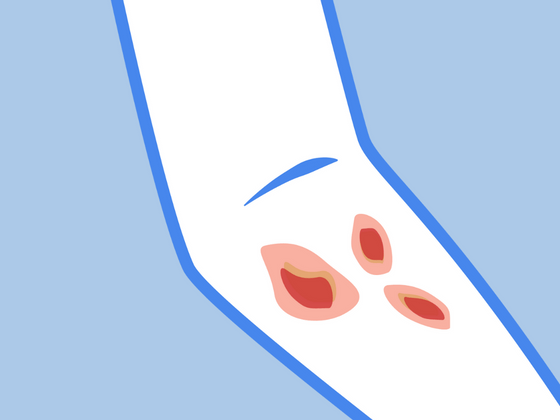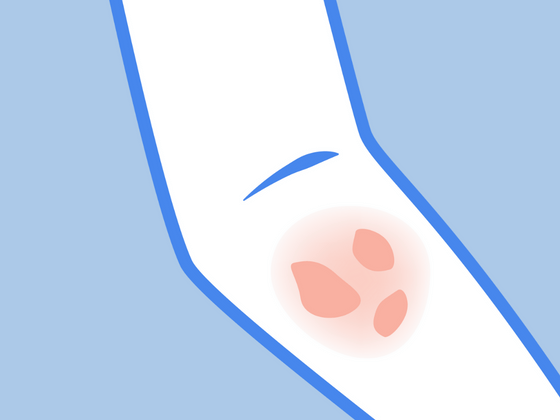The skin is the body's first line of defense against environmental germs, chemicals, and allergens, playing a critical role in your overall health.
However, for people living with eczema, a compromised skin barrier can lead to various health complications, ranging from skin dryness to more severe infections and illnesses.
Throughout this post, we'll explore everything you need to know about:
-
How a healthy skin barrier typically works
-
How eczema impacts your skin barrier function
-
Natural treatment methods for healing and strengthening your skin barrier today
If you're concerned about the knock-on effect of atopic dermatitis on your long-term skin health, keep reading to learn how to repair your damaged skin barrier and nourish healthy skin.
What Is The Purpose of The Body's Skin Barrier?
Your skin barrier refers to the outermost layer of your skin (also known as the stratum corneum), which covers your whole body.
Like a brick wall made up of bricks and mortar, your stratum corneum comprises of skin cells (called corneocytes) and immune system cells bound together by fatty acids, cholesterol, and intercellular lipids.
The skin barrier works to recognize and respond to harmful bacteria and other dangerous substances in the outside world. This protective layer also provides a home for your skin's microbiome - a community of trillions of tiny microbes that communicate with your immune system to keep your whole body safe from infections.
How Does Having Eczema Impact Your Skin's Barrier?
Atopic dermatitis is a chronic, inflammatory skin condition characterized by very dry skin and a compromised skin barrier.
But how exactly does eczema impact the health of your skin barrier? We're here to explain!
A Leaky Skin Barrier
For eczema patients, the skin barrier tends to lack adequate levels of filaggrin - a protein responsible for structurally binding your skin cells together to create a strong skin barrier. This leads to 'leaky' holes in the stratum corneum, causing broken skin and moisture loss.
This, in turn, results in itchy skin and an irresistible urge to scratch at eczema flares. When you scratch your skin, however, you further damage your delicate skin barrier, scraping off skin cells and aggravating the nerves underneath.
Skin's pH
A healthy skin barrier is slightly acidic, and it's this acidity (called the acid mantle) that helps to prevent the growth of harmful bacteria, viruses, and fungi, as well as healing wounds.
In the case of atopic dermatitis, however, the delicate balance of your skin's microbiome is thrown off-kilter, shifting your skin's pH and encouraging pathological microbes to thrive. When these harmful organisms are buried in your skin barrier, they trigger an immune system response, which leads to inflammation and itchy skin.
Symptoms of A Damaged Stratum Corneum
While having a compromised skin barrier is likely to impact each person in unique ways, there are some key symptoms to keep an eye out for:
-
Dryness and skin roughness
-
Itchy skin
-
Skin inflammation
-
Skin discoloration
-
Increased sensitivity to environmental allergens and irritants
How Do You Heal A Damaged Skin Barrier?
If these symptoms sound familiar, don't fret! You can take many practical steps today to help restore skin barrier function and heal sensitive skin.
Use A Nourishing Moisturizer
One of the most troublesome symptoms of atopic dermatitis is intense itching caused by dryness and broken skin. To improve barrier function, you must moisturize daily, helping your skin cells absorb and retain as much hydration as possible.
Applying a thick layer of moisturizer can also help to form an extra protective layer, helping defend your weakened skin barrier against infections.
For severely damaged skin, we'd recommend using the Super Dry Soother. This creamy balm is made with nourishing Chinese herbs, sunflower oil, and beeswax to heal rough, cracked, and chapped skin. This is a powerful treatment for dry eczema and psoriasis, gentle enough for babies and effective enough for adults.
Minimize Exposure To Allergens and Irritants
For people with eczema, the stratum corneum is more sensitive to environmental allergens and irritants, such as the harsh chemicals in your soaps and detergents or the rough fibers of your clothes.
Hypoallergenic Clothing
We suggest wearing hypoallergenic, gentle underwear to avoid irritating inflamed skin.
The 100% Organic Cotton Bra Liner, 100% Organic Cotton Women's latex-free panties, and 100% Organic Cotton Men's Drawstring Boxers have all been made from cooling, natural 100% organic cotton fabric. To avoid triggering an eczema flare, they are free from harmful formaldehyde, bleach, and chlorine.
Adjust Your Hygiene Routine
A regular shower or bath is a great way to wash harmful bacteria, dirt, and germs off your skin barrier. If you're trying to soothe skin irritation, however, there are a few adaptations you will want to make to your hygiene routine.
Use Lukewarm Water
For people with a leaky skin barrier, excessive hot water can dry out your skin even more and trigger inflammation. Do yourself a favor and ditch those scolding hot baths for a lukewarm soak instead.
Avoid Harsh Products
Many popular soaps and cleaning detergents include harsh chemicals that disrupt your natural skin barrier function. For example, to keep your skin squeaky clean, certain body washes might strip your skin barrier of natural oils and mess with your skin's pH.
This Tallow Bar Soap with Zinc was explicitly made for sensitive skin to calm skin conditions like red, irritated eczema. Zinc pyrithione helps to reduce skin inflammation associated with rashes, allergies, or irritation to improve skin barrier function. It is also anti-fungal and anti-bacterial and helps heal wounds, offering extra protection from infection.
How Do I Keep My Skin Healthy In The Long Run?
Atopic dermatitis is often a life-long condition requiring consistent symptom management.
To help give your skin barrier the best chance at staying strong, resilient, and supple for longer, we'd recommend you:
-
Try to limit your sun exposure to minimize harm from UV rays
-
Keep your skincare routine as simple as possible to avoid overloading your sensitive skin with a million products, chemicals, and exfoliators
-
Moisturize daily, especially during colder weather spells or if you live in a very cold or very hot climate
-
Consult a dermatologist to get expert medical advice tailored uniquely to you
Boost Your Skin Barrier Function Today
Follow these tips to help you better understand how your eczema impacts how your skin barrier functions, combating dry skin and inflammation to heal your stratum corneum today.








